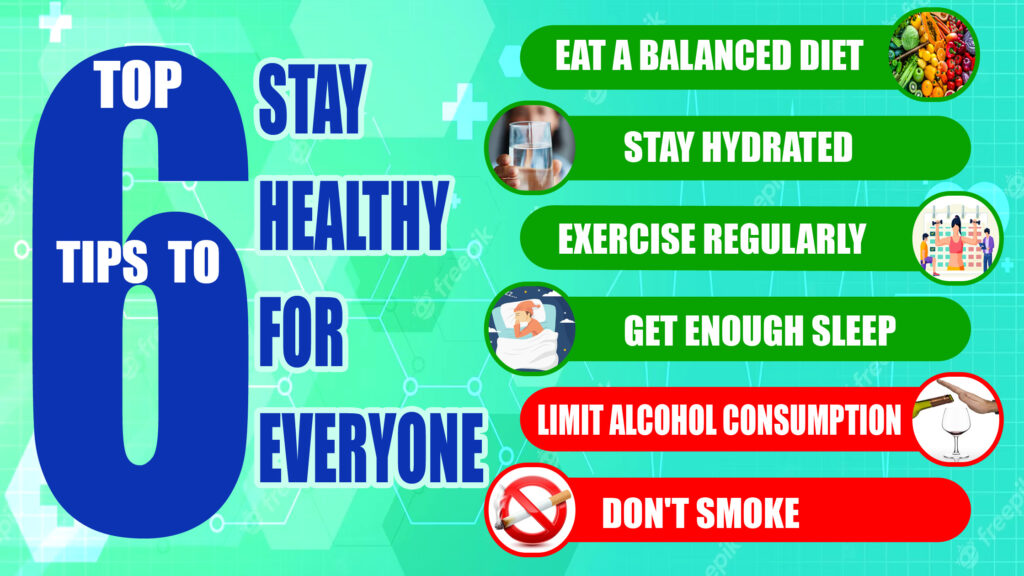Top 6 Tips to Stay Healthy for Everyone. Maintaining good health is a top priority for most people, but with so much information out there, it can be overwhelming to figure out where to start. Fortunately, there are simple steps you can take to improve your overall health and well-being. Here are the top 6 tips to stay healthy:

1. Eat a balanced diet: A healthy diet is essential for maintaining good health. Make sure to include plenty of fruits, vegetables, whole grains, lean protein, and healthy fats in your diet.
Eating a balanced diet is essential for good health. A balanced diet provides your body with the nutrients it needs to function properly and maintain good health. Here are some tips for eating a balanced diet:
- Focus on whole, unprocessed foods: Whole foods, such as fruits, vegetables, whole grains, lean protein, and healthy fats, are nutrient-dense and provide a variety of vitamins, minerals, and fiber.
- Limit processed and packaged foods: Processed and packaged foods are often high in added sugars, sodium, and unhealthy fats. These foods should be limited in your diet.
- Include a variety of fruits and vegetables: Fruits and vegetables are important sources of vitamins, minerals, and fiber. Aim to include a variety of colors and types in your diet to ensure you are getting a range of nutrients.
- Choose lean protein sources: Lean protein sources, such as chicken, fish, beans, and tofu, are important for muscle growth and repair. Try to include a variety of protein sources in your diet.
- Incorporate healthy fats: Healthy fats, such as those found in nuts, seeds, avocados, and olive oil, are important for heart health and brain function. Incorporate these healthy fats into your diet in moderation.
- Stay hydrated: Drinking plenty of water is important for maintaining good health. Aim to drink at least 8 glasses of water per day, and more if you are active or live in a hot climate.
Remember, a balanced diet is about moderation and variety. You don’t have to eliminate any food groups or deprive yourself of your favorite foods. By making small, sustainable changes to your diet, you can improve your overall health and well-being.
2. Stay hydrated: Drinking plenty of water is essential for staying healthy. Aim to drink at least eight glasses of water a day, and more if you’re active or live in a hot climate.
Staying hydrated is essential for good health. Water makes up a large portion of your body and plays a crucial role in maintaining many bodily functions. Here are some tips for staying hydrated:
- Drink plenty of water: Water is the best choice for staying hydrated. Aim to drink at least 8 glasses of water per day, and more if you are active or live in a hot climate.
- Eat hydrating foods: Many fruits and vegetables have a high water content and can help you stay hydrated. Examples include watermelon, cucumber, strawberries, and lettuce.
- Avoid sugary and caffeinated drinks: Sugary drinks, such as soda and fruit juice, can be high in calories and low in nutrients. Caffeinated drinks, such as coffee and tea, can have a diuretic effect and cause you to lose more water. Limit these drinks in your diet.
- Use a reusable water bottle: Carrying a reusable water bottle with you can make it easier to stay hydrated throughout the day. Choose a BPA-free bottle and refill it throughout the day.
- Drink water before, during, and after exercise: Exercise increases your fluid needs, so it is important to drink water before, during, and after exercise to stay hydrated.
Remember, staying hydrated is important for maintaining good health. By drinking plenty of water and incorporating hydrating foods into your diet, you can help your body function properly and feel your best.
3. Exercise regularly: Regular exercise is important for maintaining good health. Aim for at least 30 minutes of moderate-intensity exercise most days of the week.
Regular exercise is important for maintaining good health. Exercise helps improve cardiovascular health, strengthens muscles and bones, and can help reduce the risk of many chronic diseases. Here are some tips for incorporating exercise into your daily routine:
- Start slowly: If you are new to exercise, start slowly and gradually increase the intensity and duration of your workouts. This can help prevent injury and make exercise feel more manageable.
- Find an activity you enjoy: Exercise doesn’t have to feel like a chore. Find an activity you enjoy, whether it’s dancing, hiking, swimming, or lifting weights, and make it a part of your routine.
- Make it a habit: Schedule time for exercise in your calendar, just like you would for any other appointment. Making exercise a habit can help ensure you stick with it.
- Vary your workouts: Mix up your workouts to keep things interesting and challenge your body in different ways. Try different types of exercise, such as strength training, cardio, and yoga.
- Listen to your body: Pay attention to how your body feels during and after exercise. If you feel pain or discomfort, adjust your workout or take a break if needed.
- Stay active throughout the day: Incorporate movement into your daily routine by taking the stairs, going for a walk during your lunch break, or doing some stretching at your desk.
Remember, any amount of exercise is better than none. By incorporating physical activity into your daily routine, you can improve your overall health and well-being.
4. Get enough sleep: Getting enough sleep is essential for your physical and mental health. Aim for 7-9 hours of sleep each night.
Getting enough sleep is essential for good health. Sleep is important for many bodily functions, including physical and mental recovery and growth, memory consolidation, and hormonal regulation. Here are some tips for getting enough sleep:
- Stick to a sleep schedule: Try to go to bed and wake up at the same time every day, even on weekends. This can help regulate your body’s natural sleep-wake cycle.
- Create a relaxing bedtime routine: Establish a relaxing bedtime routine to help you wind down before bed. This may include reading a book, taking a warm bath, or practicing relaxation techniques like meditation.
- Create a sleep-conducive environment: Make sure your sleep environment is comfortable, cool, and quiet. Consider using earplugs, an eye mask, or white noise if necessary.
- Limit caffeine and alcohol: Caffeine and alcohol can interfere with sleep. Limit caffeine consumption to the morning hours and avoid drinking alcohol close to bedtime.
- Avoid electronics before bedtime: The blue light emitted by electronics can interfere with sleep. Avoid using electronic devices, such as phones, tablets, and computers, for at least an hour before bed.
- Exercise regularly: Regular exercise can help improve sleep quality. However, avoid exercising close to bedtime, as it can be stimulating and make it harder to fall asleep.
Remember, getting enough sleep is important for good health. By creating a sleep-conducive environment, establishing a relaxing bedtime routine, and limiting caffeine and alcohol consumption, you can help ensure you get the restful sleep your body needs..
5. Limit alcohol consumption: Excessive alcohol consumption can have a negative impact on your health. Limit your alcohol consumption to moderate levels.
Limiting alcohol consumption is important for maintaining good health. While moderate alcohol consumption has been linked to some health benefits, excessive drinking can have negative effects on many bodily functions, including the liver, heart, and brain. Here are some tips for limiting alcohol consumption:
- Set limits: Set limits on how much alcohol you will consume on any given occasion. The recommended limit is up to one drink per day for women and up to two drinks per day for men.
- Pace yourself: Pace yourself when drinking by sipping slowly and taking breaks between drinks. This can help prevent over consumption and reduce the negative effects of alcohol.
- Drink water: Drink water between alcoholic beverages to stay hydrated and help prevent over consumption.
- Avoid binge drinking: Binge drinking is defined as consuming four or more drinks for women and five or more drinks for men in a single sitting. Avoid binge drinking, as it can have negative effects on your health.
- Don’t drink and drive: Never drink and drive. If you plan to drink, arrange for a designated driver or use public transportation to get home safely.
Remember, while moderate alcohol consumption may have some health benefits, excessive drinking can have negative effects on your health. By setting limits, pacing yourself, and avoiding binge drinking, you can help ensure you consume alcohol in a responsible and healthy manner.
6. Don’t smoke: Smoking is a leading cause of preventable death. Quitting smoking can have significant health benefits.
Not smoking is one of the best things you can do for your health. Smoking is a leading cause of many chronic diseases, including lung cancer, heart disease, stroke, and respiratory diseases. Here are some tips for quitting smoking:
- Set a quit date: Choose a specific date to quit smoking and stick to it. This can help you mentally prepare for the challenge ahead.
- Seek support: Let your family, friends, and healthcare provider know you are quitting smoking and ask for their support. Join a support group or use a quit line for additional support.
- Consider nicotine replacement therapy: Nicotine replacement therapy, such as nicotine patches, gum, or lozenges, can help ease withdrawal symptoms and make it easier to quit smoking.
- Avoid triggers: Identify and avoid triggers that make you want to smoke, such as drinking alcohol or being around other smokers.
- Practice stress management: Smoking is often used as a coping mechanism for stress. Practice stress management techniques, such as deep breathing, meditation, or yoga, to help manage stress without smoking.
- Stay positive: Quitting smoking can be difficult, but staying positive can help you stay motivated. Celebrate your progress and reward yourself for milestones along the way.
Remember, quitting smoking is one of the best things you can do for your health. By seeking support, avoiding triggers, and practicing stress management techniques, you can help ensure a successful quit attempt and improve your overall health and well-being..
Top 6 Tips to Stay Healthy for Everyone
Remember, staying healthy is a journey, not a destination. Incorporating healthy habits into your daily routine takes time and effort, but the benefits are worth it. By making small, sustainable changes, you can improve your overall health and well-being for years to come.
Taking care of your health doesn’t have to be complicated. By following these top 6 tips, you can improve your overall health and well-being. Start small, and gradually incorporate these healthy habits into your daily routine to create lasting change. Remember, small changes can make a big difference in your health!



